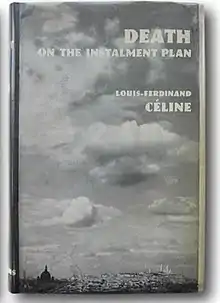Death on Credit
Death on Credit (French: Mort à crédit, US translation: Death on the Installment Plan) is a novel by author Louis-Ferdinand Céline, published in 1936. The most common, and generally most respected English translation is Ralph Manheim's.[1]
 1938 English-language translation (publ. Chatto & Windus, UK) | |
| Author | Louis-Ferdinand Céline |
|---|---|
| Original title | Mort à crédit |
| Translator | John H. P. Marks (1938), Ralph Manheim (1966) |
| Country | France |
| Language | French |
Publication date | 1936 |
| ISBN | 978-1-84749-041-4 |
| OCLC | 228581886 |
Contents
In Death on Credit, Ferdinand, Céline's alter ego, is a doctor in Paris, treating the poor who seldom pay him but take every advantage of his availability. The action is not continuous but goes back in time to earlier memories and often moves into fantasy, especially in Ferdinand's sexual escapades; the style becomes deliberately rougher and sentences become terser to emulate everyday Parisian tragedies: struggles to make a living, illness, venereal disease, the stories of families whose destiny is governed by their own stupidity, malice, lust and greed.
In popular culture
The novel is referenced in the autobiographical first chapter of Kurt Vonnegut's Slaughterhouse-Five as well as Anthony Swofford's Jarhead.
In the 1998 film Wild Things, the character of Suzie Marie Toller (Neve Campbell) is encountered by the police while reading a paperback edition of Death on the Installment Plan—a subtle indication of the attitude of the character and her role in the plot.
References